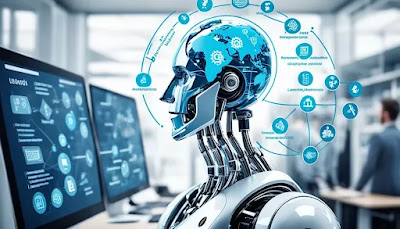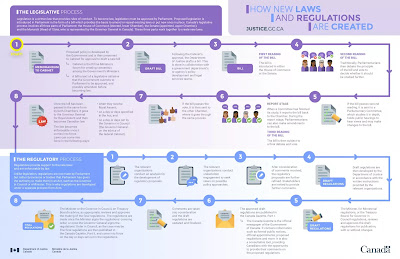The Impact of AI on the Global Economy: A 2024 Perspective
AI is a powerful driver of productivity, enabling businesses to automate repetitive tasks, optimize operations, and enhance decision-making processes. In sectors like manufacturing, AI-powered robots and predictive maintenance tools are reducing downtime, improving efficiency, and lowering costs. In service industries, AI-driven chatbots, recommendation systems, and personalized marketing tools are enhancing customer experience and driving sales.
According to a McKinsey Global Institute report, AI could potentially add $13 trillion to the global economy by 2030, boosting global GDP by up to 1.2% annually. In 2024, we are already seeing early signs of this growth, with businesses increasingly adopting AI tools to enhance productivity and innovation.
2. Transformation of Labor Markets
While AI creates new opportunities, it also poses significant challenges to the labor market. Automation and AI technologies are expected to displace certain jobs, especially those involving routine or manual tasks. For example, jobs in data entry, customer service, and assembly line manufacturing are at high risk of automation.
However, AI also creates new job opportunities in AI development, data analysis, cybersecurity, and other tech-driven fields. The demand for AI specialists, machine learning engineers, data scientists, and AI ethicists is rapidly growing. In 2024, the focus is increasingly on the "reskilling revolution," where both governments and businesses are investing in upskilling programs to prepare the workforce for AI-driven roles.
3. Enhancing Innovation Across Industries
AI is accelerating innovation across multiple industries:
Healthcare: AI is transforming healthcare by enabling faster and more accurate diagnoses, personalized treatment plans, and drug discovery. AI-powered diagnostic tools are improving patient outcomes and reducing costs. In 2024, AI-driven predictive analytics are increasingly used for public health planning and managing healthcare resources.
Finance: AI is revolutionizing the finance sector by enhancing fraud detection, risk management, and algorithmic trading. AI-based chatbots and robo-advisors are providing personalized financial advice, while machine learning models are enabling faster and more accurate credit scoring.
Retail: In retail, AI is optimizing supply chains, inventory management, and pricing strategies. AI-driven recommendation engines enhance customer experiences by providing personalized shopping suggestions. In 2024, AI is also being used to enhance the in-store experience with virtual try-ons and smart shelves.
Agriculture: AI is driving a revolution in precision farming, helping farmers optimize crop yields, reduce water usage, and manage pests more effectively. AI-powered drones and sensors are providing real-time data for better decision-making.
AI is playing a critical role in enhancing supply chain efficiency. In 2024, companies are increasingly using AI for demand forecasting, inventory management, and logistics optimization. AI algorithms can predict supply chain disruptions, optimize routes for transportation, and manage inventory levels in real time, reducing waste and lowering costs.
The use of AI in logistics is also reducing delivery times and improving customer satisfaction. Autonomous delivery vehicles, drones, and AI-driven warehouse robots are becoming more common, enabling faster and more efficient supply chain operations.
5. Fostering New Business Models and Economic Sectors
AI is fostering the creation of entirely new business models and economic sectors. For instance:
AI-as-a-Service (AIaaS): Many companies are now offering AI capabilities on a subscription basis, allowing businesses to leverage advanced AI tools without investing in expensive infrastructure.
AI-driven Startups: The rise of AI is fueling the growth of AI-driven startups across various sectors, from fintech and healthcare to education and entertainment. In 2024, venture capital investments in AI startups continue to grow, reflecting the increasing demand for AI-driven innovation.
Edge AI and IoT Integration: The integration of AI with the Internet of Things (IoT) is creating new opportunities for smart cities, smart homes, and industrial automation. Edge AI—where AI processing happens closer to the source of data rather than in centralized cloud servers—is gaining traction in sectors like automotive (for autonomous vehicles), manufacturing, and healthcare.
While AI offers significant economic benefits, it also raises concerns about inequality and ethics:
Wealth Inequality: There is a risk that AI could widen the gap between high-income and low-income countries, as well as between skilled and unskilled workers. Countries and companies with access to advanced AI technologies are likely to gain a competitive advantage, potentially exacerbating existing economic disparities.
Ethical and Privacy Concerns: The use of AI in decision-making raises ethical issues, such as bias in AI algorithms, privacy concerns, and the potential misuse of AI technologies. In 2024, there is increasing pressure on governments and companies to establish clear ethical guidelines and regulatory frameworks to ensure the responsible use of AI.
Governments around the world are grappling with how to regulate AI effectively. In 2024, we are seeing a growing number of countries introduce AI regulations to address ethical concerns, data privacy, and security issues. The European Union’s AI Act, for example, is one of the first comprehensive regulatory frameworks for AI, setting rules on transparency, accountability, and risk management.
The challenge for policymakers is to create regulations that protect consumers and promote ethical use without stifling innovation. Striking the right balance will be crucial to ensuring that AI delivers its full potential for economic growth.
***Conclusion: Navigating the AI-Driven Economy
In 2024, AI is becoming an integral part of the global economy, driving growth, fostering innovation, and reshaping industries. While the potential benefits of AI are immense, realizing them will require careful management of the risks associated with job displacement, inequality, and ethical concerns.
For businesses, embracing AI presents both opportunities and challenges. Success will depend on the ability to adapt to new technologies, upskill workers, and navigate the evolving regulatory landscape. For policymakers, fostering an environment that encourages innovation while addressing ethical and societal concerns will be key to ensuring that the benefits of AI are widely shared.
#AI #Impact_Of_AI_on_the_Global_Economy #Boosting_Productivity&Economoc_Growth












No comments:
Post a Comment
thanks for your comments.